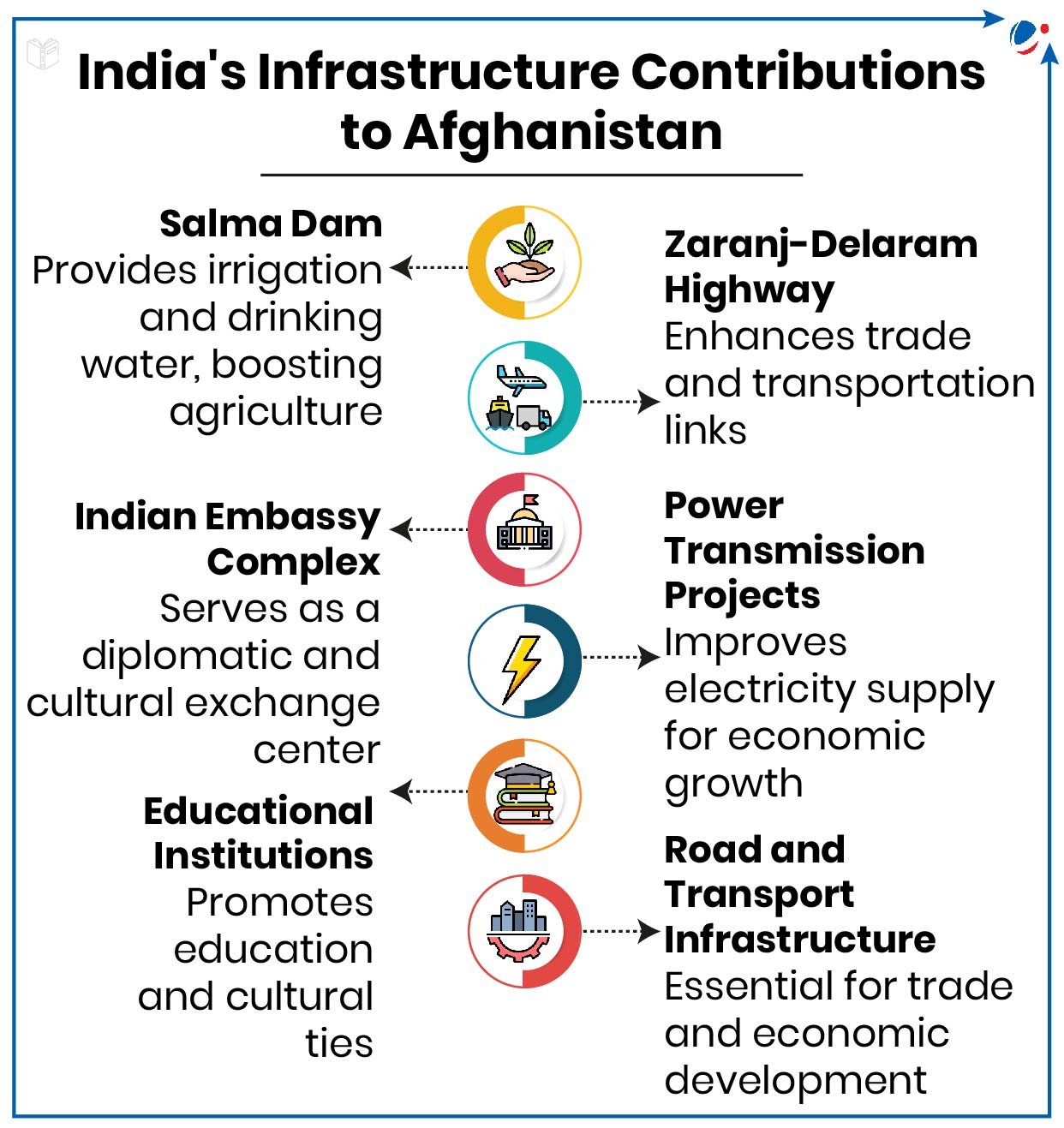Why in the news?

Recently, 1st bilateral meeting between India's foreign secretary and Afghanistan's acting foreign minister took place in Dubai.
More on the news
- The meet marks India's diplomatic shift and growing engagement with Taliban-backed Afghan government.
- This was the highest level of engagement with Taliban since the latter's takeover of Kabul in 2021 post US withdrawal.
- Earlier in November, 2024, 1st official meeting between Indian diplomats and Taliban's defence minister took place in Kabul.
Why shift in India's diplomatic policy?
- Deteriorating Afghan–Pakistan relations: The recently strained relationship between the two countries provides an opportunity for India to isolate Pakistan from the region.
- E.g., Pakistan has expelled more than 5,00,000 refugees, creating a humanitarian crisis in Afghanistan;

- Pakistani airstrike on eastern Afghanistan to neutralize Tehrik-e-Taliban Pakistan (TTP) camps, has been alleged as a direct violation to Afghan's sovereignty.
- To counter rising Chinese influence: Since Taliban's return, China has been taking aggressively proactive steps in normalizing its ties with Afghanistan.
- E.g., China's appointment of new ambassador, signing minerals and other mining contracts, taking up urban development projects in Kabul etc.
- To prevent Afghan-soil based terrorism: Afghanistan has been used as launchpad by terror groups; constructive engagement ensures that Taliban would not allow Afghan territory to be used against India.
- E.g., Since the US withdrawal, India has been cognizant of covert or overt threat from Pakistan-backed terrorist groups operating in Afghanistan, such as Lashkar-e-Tayyaba (LeT), Jaish-e-Mohammad (JeM) etc.
- To strengthen connectivity and access to Central Asia: Afghanistan's strategic location at 'Heart of Asia' – crossroads of Central and South Asia – is significant, as it has served as a route to India since the ancient times through the selected passage of Khyber and Bolan.
- E.g., Collaborating with Iran on Chabahar port development will improve access to Central Asia via Afghanistan.
- To restart developmental projects and secure already done investments: E.g., India has invested more than $ 3 billion in over 500 projects across Afghanistan, including roads, power lines, dams, hospitals etc.
- India has also trained Afghan officers, awarded thousands of scholarships to students and built a new parliament building in Afghanistan.
- To strengthen India's soft power: In the form of humanitarian assistance like providing wheat supplies to drought-affected Afghanistan in late 2021.
- E.g., in the Union Budget for 2024-25, India allocated Rs 50 crore for assistance to Afghanistan.
- To ensure stability in the region: India is concerned about the potential for instability in Afghanistan spilling over into the region.
Why the shift in diplomatic approach can be challenging?
- Taliban's internal dynamics: Taliban being a violent and brutal actor has done little to reform itself from what it was in the 1990s, especially in its treatment towards women and girls.
- E.g., Since its return to power, Taliban has failed to form a functioning inclusive government to provide the Afghan people with basic economic opportunities, health facilities, educational options etc.
- Terrorism and security concerns: Taliban is known to back global and regional terror outfits in their courtyard, which poses a direct security threat to India.
- E.g., Presence of terror groups such as Islamic State of Khorasan (ISKP), Al-Qaeda, Pakistan-backed LeT, JeM etc. have made the region more vulnerable to radicalism, and extremism.
- Drug trafficking: Afghanistan is the leading producer of opium globally, and the drug trade has fueled instability and violence in the region, impacting both Afghanistan and India.
- E.g., in 2021, over 80% of world's opium originated from Afghanistan, and India fears that the earning could be used for terror financing.
- Increasing presence of China: China's rising involvement in Afghanistan after Taliban's takeover has raised concerns in India over Beijing's expanding influence and engagements in the region.
- E.g., China is keen on expanding China-Pakistan Economic Corridor (CPEC) to Afghanistan.
Way forward
- Act West Policy: India should be realism in acting west, and should capitalize its traditional friendship and engage Afghanistan more prominently in its 'Act West Policy'.
- Humanitarian assistance: Keeping in mind the complex geopolitical chessboard and to counter China, India should enhance its humanitarian assistance for Afghan's health sector and for rehabilitation of refugees.
- Resuming developmental projects: Increasing investments through developmental projects would improve the Afghan economy, create jobs, curb drug trafficking, reduce terrorism and would also deepen India's economic engagement with Afghanistan.
- Cultural engagements: Develop people-to-people ties through liberalizing the visa regime for Afghan people, sports (cricket) infrastructure support, educational scholarships etc.
- Enhanced diplomatic engagements: At various international and multi-lateral forums such as South Asian Association for Regional Cooperation (SAARC) etc.



